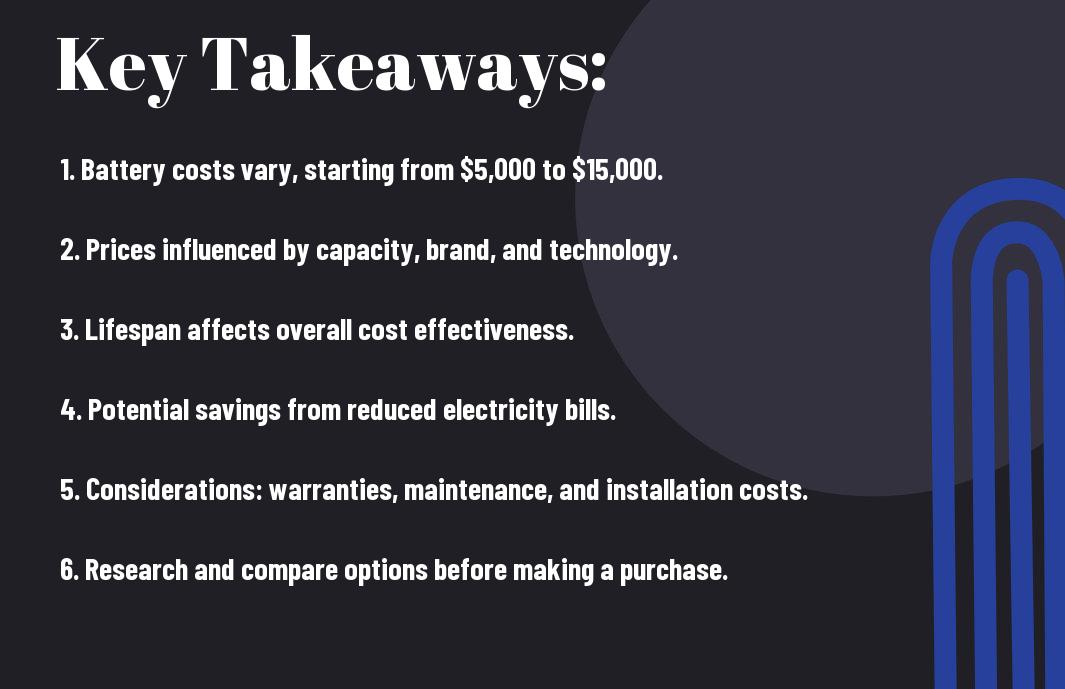Curious about the cost of solar panel batteries for your home’s energy needs? Investing in solar technology can be a wise decision for both your wallet and the environment. When considering solar panel batteries, the cost can vary depending on several factors such as the size of your system, the brand, and the specific technology used. Let’s break down the different costs associated with solar panel batteries to help you make an informed decision for your sustainable energy journey.
Key Takeaways:
- Solar Panel Battery Costs: The cost of solar panel batteries can range from $5,000 to $15,000 or more, depending on the size and capacity of the battery.
- Factors Influencing Cost: Several factors can influence the cost of solar panel batteries, including brand, capacity, warranty, and technology.
- Installation Costs: In addition to the cost of the battery itself, installation costs for solar panel batteries can vary and should be factored into the overall cost.
- Return on Investment: While the upfront cost of solar panel batteries may be high, the long-term savings on energy bills and potential incentives can provide a return on investment over time.
- Comparison Shopping: It is important to compare different brands and types of solar panel batteries to find the best option that fits your budget and energy needs.

Factors Affecting Solar Panel Battery Costs
While the initial cost of solar panel batteries may seem high, it is crucial to understand the various factors that influence their prices. By considering these factors, you can make informed decisions when investing in solar energy storage solutions.
Type and Quality of Batteries
Factors such as the type and quality of batteries play a significant role in determining their cost. Lithium-ion batteries, for instance, are known for their high efficiency and durability, making them more expensive than lead-acid batteries. Higher quality batteries with advanced features and longer warranties also tend to come with a higher price tag.
- Choosing the right type of battery for your solar panel system is crucial for ensuring optimal performance and longevity.
Capacity and Size of Batteries
Type and size of battery you choose can also impact the overall cost. Batteries with larger storage capacity will typically cost more than those with lower storage capacity. Additionally, the physical size of the battery will also play a role in determining the installation costs, as larger batteries may require more space and specialized equipment for installation.
To make an informed decision about the capacity and size of the batteries you need, you should consider factors such as your energy consumption patterns, the size of your solar panel system, and your budget constraints.
Brand and Manufacturer
One of the key factors that influence the cost of solar panel batteries is the brand and manufacturer. Well-known brands with a proven track record of reliability and performance may cost more than lesser-known brands. However, investing in reputable brands can provide you with peace of mind knowing that you are purchasing a quality product that is likely to last for years to come.
This can be seen as a long-term investment, as high-quality batteries from trusted manufacturers are less likely to require frequent replacements or repairs, ultimately saving you money in the long run.
Average Costs of Solar Panel Batteries
Lead-Acid Batteries
One common type of solar panel battery is the lead-acid battery. These batteries are affordable but have a shorter lifespan compared to other options. On average, lead-acid batteries can cost around $100 to $300 per kilowatt-hour of storage capacity. While they may be a cost-effective choice initially, you may need to replace them sooner than other types of batteries.
Lithium-Ion Batteries
An increasingly popular choice for solar panel batteries is lithium-ion batteries. These batteries offer higher energy density and longer lifespans compared to lead-acid batteries. The average cost of lithium-ion batteries ranges from $300 to $800 per kilowatt-hour. Although they come with a higher price tag, the durability and efficiency of lithium-ion batteries make them a worthwhile investment for your solar energy system.
Batteries typically make up a significant portion of the overall cost of a solar panel system. However, their longevity and performance capabilities often justify the higher upfront investment.
Flow Batteries
Solar panel systems can also utilize flow batteries for energy storage. Flow batteries offer advantages such as scalability and long cycle life, making them a reliable choice for solar energy storage. The average cost of flow batteries ranges from $500 to $1,500 per kilowatt-hour. While they may be more expensive than other options, the versatility and efficiency of flow batteries can make them a valuable addition to your solar panel system.
Costs can vary depending on the specific brand, capacity, and additional features of the battery you choose for your solar panel system. It’s vital to consider your energy needs and long-term goals when selecting the right battery for your solar energy setup.

Cost Breakdown of Solar Panel Battery Systems
Despite the numerous benefits of solar panel battery systems, the overall cost can be a significant factor to consider. It’s imperative to understand the breakdown of costs involved in these systems to make an informed decision.
Battery Cost
Solar panel battery costs can vary depending on the capacity and brand of the battery. Typically, a solar battery can range from a few hundred to several thousand dollars. It’s crucial to invest in a high-quality battery that can store enough energy for your household needs while ensuring longevity.
Inverter Cost
Inverter costs are another important component of solar panel battery systems. The inverter converts the direct current (DC) electricity generated by the solar panels into alternating current (AC) electricity used in your home. The cost of inverters can vary based on the size and efficiency of the system you choose.
It’s imperative to select an inverter that can handle the electricity load of your household and maximize the efficiency of your solar panel system.
Installation Cost
When considering the installation cost of solar panel battery systems, you need to account for the labor, permits, and additional equipment required for the setup. Professional installation ensures that your system operates efficiently and is installed safely according to local regulations.
Systems with more complex designs or larger storage capacities may incur higher installation costs. However, investing in professional installation can provide peace of mind and ensure optimal performance of your solar panel battery system.
Monitoring and Maintenance Cost
One crucial aspect often overlooked is the monitoring and maintenance cost of solar panel battery systems. Monitoring systems allow you to track the performance of your solar panels and battery storage, ensuring everything is functioning correctly.
Understanding the additional costs associated with monitoring and maintenance can help you budget effectively and ensure the long-term efficiency and reliability of your solar panel battery system.
Benefits of Investing in Solar Panel Batteries
Energy Independence
Unlike traditional grid-tied systems, solar panel batteries allow you to store excess energy generated during the day for use at night or during power outages. Any surplus electricity produced by your solar panels can be saved for when you need it most, reducing your reliance on the grid and providing you with greater energy independence.
Reduced Electricity Bills
Energy costs continue to rise, and investing in solar panel batteries can help you reduce your electricity bills significantly. By storing excess energy for later use, you can minimize the amount of electricity you need to purchase from the grid, ultimately leading to lower monthly utility bills.
Solar panel batteries work by storing energy during off-peak hours when electricity rates are lower and using it during peak hours when rates are higher. This allows you to take advantage of time-of-use pricing and maximize your savings on electricity expenses.
Increased Property Value
With solar panel batteries installed in your home, you not only benefit from reduced electricity bills and energy independence but also from increased property value. By adding a solar battery system to your solar panel setup, you make your property more attractive to potential buyers, as it offers the added value of energy efficiency and security during blackouts.
It is estimated that homes equipped with solar panel batteries can see an increase in property value of up to 4%, making it a worthwhile investment for both your present savings and future returns.

Comparing Costs: Solar Panel Batteries vs. Grid Electricity
Not only are solar panel batteries an eco-friendly choice, but they can also lead to cost savings when compared to relying solely on grid electricity. Let’s break down the costs in a clear and concise manner:
Short-Term Savings
Short-Term Savings
Savings on your electricity bill can start almost immediately after installing solar panel batteries. During peak hours when grid electricity rates are high, you can switch to using stored energy from your batteries, reducing your reliance on expensive grid power.
Additionally, some regions offer incentives or rebates for installing solar panel batteries, further offsetting the initial investment cost.
Long-Term Savings
Long-Term Savings
An investment in solar panel batteries translates to long-term savings on your electricity bills. As grid electricity rates continue to rise, your stored solar energy becomes more valuable, resulting in significant savings over the lifespan of the batteries.
With each passing year, as you rely more on your self-generated solar power, you’ll see a substantial decrease in your reliance on grid electricity, thereby reducing your overall energy expenses.
Environmental Impact
Environmental Impact
One of the most significant benefits of opting for solar panel batteries is the positive environmental impact. By using stored solar energy, you can reduce your carbon footprint by decreasing your dependence on traditional energy sources that contribute to greenhouse gas emissions. This environmentally conscious choice not only benefits you financially but also contributes to a greener planet for future generations.
The environmental benefits of solar panel batteries extend beyond just reducing carbon emissions. By promoting sustainable energy practices, you are actively participating in the global effort to combat climate change and preserve the planet for future generations.
Financing Options for Solar Panel Batteries
Many financial options are available to help you invest in solar panel batteries. To learn more about different financing choices, you can refer to the Guide to Solar Batteries: Are They Worth It? (June 2024). This guide can provide valuable insights into the costs and benefits associated with various financing methods.
Cash Purchase
Solar panel batteries can be a significant upfront investment, but purchasing them outright with cash can offer long-term savings. By paying in cash, you avoid interest charges and may be eligible for various rebates or incentives that can lower the overall cost of your system.
Loan Options
When considering loan options for solar panel batteries, it’s important to shop around for competitive rates and terms. Loans can help you spread out the cost of your system over time, making it more affordable to invest in renewable energy. Additionally, some loans may offer tax benefits or other incentives that can further reduce your expenses.
To make the most informed decision about loan options, you should explore different lenders, compare interest rates, and understand the total cost of borrowing for your solar panel battery system. It’s crucial to find a loan that fits your budget and financial goals to maximize the benefits of your investment.
Leasing Options
To make solar panel batteries more accessible, leasing options are available for those who may not want to commit to a full purchase. With a lease, you can pay a monthly fee to use the batteries without the responsibility of ownership. This can be a suitable option for those looking for a more flexible arrangement or who are not able to make a large upfront payment.
The decision to lease a solar panel battery system should be carefully considered. While leasing can provide immediate cost savings and maintenance services, you won’t own the system, and you may miss out on potential long-term benefits. It’s important to weigh the pros and cons of leasing carefully to determine if it aligns with your energy and financial objectives.
Final Words
Now that you have a better understanding of how much solar panel batteries cost, you may be wondering if they are worth the investment. To dive deeper into this topic, you can explore this article on Solar Batteries: Are They Worth The Cost? This will provide you with additional insights to help you make an informed decision.
Recall, the cost of solar panel batteries can vary depending on various factors, but they can offer long-term benefits in terms of energy savings and sustainability. As you assess your options, consider the long-term value that solar panel batteries can bring to your home or business, and whether the initial investment aligns with your goals for renewable energy and reducing your carbon footprint.
FAQ
Q: How much do solar panel batteries cost?
A: The cost of solar panel batteries can vary based on factors such as capacity, brand, and technology. On average, a solar panel battery can cost anywhere from $5,000 to $15,000.
Q: What factors influence the cost of solar panel batteries?
A: The cost of solar panel batteries is influenced by factors such as the capacity of the battery (measured in kilowatt-hours or kWh), the brand, the type of technology used (such as lithium-ion or lead-acid), and any additional features like built-in inverters or monitoring systems.
Q: Are there any incentives or rebates available to help offset the cost of solar panel batteries?
A: Yes, there are often incentives and rebates available at the state or federal level to help offset the cost of solar panel batteries. These incentives can include tax credits, rebates, or other financial incentives to encourage the adoption of solar energy storage systems.
